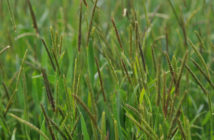David Huish, seed sales manager for Peterborough-based Daltons ltd. who are the largest independent family-owned seed business in the UK says, “Daltons are committed to producing high quality seed and a service to match.”
He has been considering this autumn’s winter oilseed rape area and thinks it could well decrease by 10% this autumn. “The main reason is that the oilseed rape market has dropped considerably, and the value is getting closer to the cost of production. Also, many growers have problems of blackgrass and are introducing more spring cereals on the farm.” Neil Groom general manager for Grainseed comments that “Commodity prices could increase with recent activity in Ukraine and Russia. The global prices shift so quickly; in one year’s time the value of seed could easily by higher again and the growers make an excellent profit again.” He is anticipating an increase in rape area.
Considering varieties, Mr Huish says that the market is split into growers who like hybrids and those that like conventionals. “Hybrids are thought to be more vigorous than conventionals, although that is not always the case. The conventional variety Campus is vigorous and the new conventional variety Pinnacle from Grainseed that we are considering is also vigorous. Vigour needs to be both in the autumn to allow the crop to grow away from cabbage stem flea beetle and in the spring to get away from the winter,” says David.
The main varieties this year have been the hybrid Aurelia as Number 1, followed by Acacia which is a conventional at Number 2. At number 3 is the hybrid Ambassador and at 4 is Matrix Clearfield and at 5 conventional Campus.
This last variety has been grown for over 10 years. It is popular as it performs consistently and well.
Mike Pickford who is the last UK breeder breeding conventional oilseed rape varieties, says that “Pinnacle (which he bred) has performed very well in official and private independent trials and has consistently outperformed the popular conventional variety Campus as well as many hybrids. In national List 1 trials, Pinnacle yielded 108% which was 5% more than Campus. In NL2 trials it outperformed Campus by 4%, yielding 104% – it was the top conventional variety.” Mr Huish has seen Pinnacle in trials for 3 years and is hoping that it will perform well this year too. He feels a successful variety needs yield as well as consistency, particularly if you are looking to make an impact on such a strong variety as Campus. Pinnacle needs one more year to show its consistency, he feels.
Ideally suited to UK conditions

David Huish Daltons Seeds
Mr Pickford says “I breed varieties that are ideally suited to UK conditions. My breeding philosophy is simple and that is to improve individual yield components, such as increasing the size of the seed. Pinnacle has seed with a thousand grain weight between 6.5 to 7gms compared to Campus at 5 to 6 gms. The varieties I have bred in the Cotswolds are just right for our conditions.” he says.
“Pinnacle has similar vigour and biomass to hybrids. Its shows rapid growth during the stem elongation phase and in terms of agronomics, it has a top 9 rating for lodging resistance and an 8 for stem stiffness. It also maintains clean green stems when ripening allowing more efficient photosynthesis during the ripening grain filling process. In terms of ripening, it is medium to early, like Campus. This allows the following crop to be planted in good time whist the rape seed is already in storage,” says Mike. He adds that Pinnacle is a large-seeded variety with good oil content of 44.3%.
Mr Huish says that chosen varieties also need a good disease package as this lends itself to a consistent performance. As for most Grainseed rape varieties, Pinnacle has a great disease profile. It has a 7 for Light leaf spot, a 6 for Phoma and good Verticillium resistance.
“A variety such as Pinnacle offers growers peak yields and consistency,” says Neil Groom, general manager for Grainseed. “Last harvest that extra 5% over Campus was well worth it. We are assuming rape price at harvest next year will have steadied a bit and will be around £400/tonne. If we take the yield from the RL candidate table for seed yield, Campus yielded 5.05 t/ha which at £400/t results in £2020/ha but Pinnacle yielded 5.25t/ha giving a total figure of £2100/ha which is £80/ha more.”
“Growing a high yielding consistent variety such as Pinnacle with good price levels will make rape an excellent break crop to sow this autumn. We have a small amount of seed this autumn if growers would like to try it. We have high hopes for this variety in the future,” says Mr Groom.




